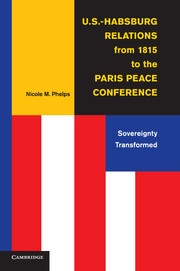Description
U.S.-Habsburg Relations from 1815 to the Paris Peace Conference
Sovereignty Transformed
Author: Phelps Nicole M.
This study chronicles US-Habsburg relations from the early nineteenth century through the aftermath of World War I.
Language: English
Subject for U.S.-Habsburg Relations from 1815 to the Paris Peace...:
Approximative price 39.35 €
In Print (Delivery period: 14 days).
Add to cart
U.S.-Habsburg Relations from 1815 to the Paris Peace Conference
Publication date: 08-2015
Support: Print on demand
Publication date: 08-2015
Support: Print on demand
Approximative price 92.03 €
In Print (Delivery period: 14 days).
Add to cart
U.S.-Habsburg Relations from 1815 to the Paris Peace Conference
Publication date: 08-2013
306 p. · 15.2x22.9 cm · Hardback
Publication date: 08-2013
306 p. · 15.2x22.9 cm · Hardback
Description
/li>Contents
/li>Biography
/li>
This study provides the first book-length account of US-Habsburg relations from their origins in the early nineteenth century through the aftermath of World War I and the Paris Peace Conference. By including not only high-level diplomacy but also an analysis of diplomats' ceremonial and social activities, as well as an exploration of consular efforts to determine the citizenship status of thousands of individuals who migrated between the two countries, Nicole M. Phelps demonstrates the influence of the Habsburg government on the integration of the United States into the nineteenth-century great power system and the influence of American racial politics on the Habsburg empire's conceptions of nationalism and democracy. In the crisis of World War I, the US-Habsburg relationship transformed international politics from a system in which territorial sovereignty protected diversity to one in which nation-states based on racial categories were considered ideal.
Introduction: the Habsburg empire and the United States in transnational perspective; 1. Community and legitimacy: the diplomatic culture of the great power system; 2. Becoming a great power: US-Habsburg diplomatic relations and the integration of the United States into the great power system; 3. Protection and the problems of dual citizenship: US consuls in the Habsburg empire; 4. The limits of state-building: Habsburg consuls in the United States and the protection of lives and property; 5. Racial identity and political citizenship: American challenges to Habsburg sovereignty; 6. Giving up on Austria-Hungary: the end of the great power system and the shift to the nationalist successors; 7. Establishing sovereignty: the process of aligning race, place, and citizenship; Conclusion.
Nicole M. Phelps is Assistant Professor of History at the University of Vermont. She won the Austrian Cultural Forum Dissertation Prize in 2010 and an honorable mention for SHAFR's Unterberger Dissertation Prize in 2009.
© 2024 LAVOISIER S.A.S.
These books may interest you

The Habsburg Monarchy, 1618–1815 36.76 €

The Habsburg Monarchy, 1618–1815 96.55 €


